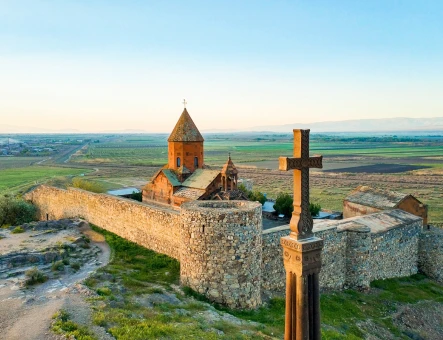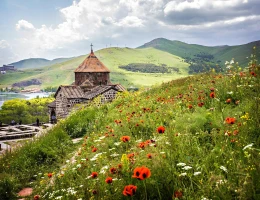Group tour: Khor Virap, Azat Reservoir, Garni, Lavash baking and Holiday sweet master classes, Geghard
Khor Virap Monastery, Azat reservoir view point, Lavash baking master class, Holiday sweet master class, Garni Temple, Geghard Monastery
1. Khor Virap Monastery
50-60 min























2. Azat Reservoir
10-20 min





Lavash baking master class
15-20 min

















Lavash is one of the most popular gastronomic icons of Armenia, serving as an integral part of the Armenian cuisine. It is a traditional soft, thin flatbread, made in tonir (special ground oven). Although the baking process of lavash requires much of special skills, it is undertaken by women. For centuries lavash has been consumed by all classes of Armenian society, it is valued for the unique taste and the ability to be stored for quite a long period of time without losing its positive qualities.
In 2014 "The preparation, meaning and appearance of traditional bread lavash as an expression of Armenian culture" was inscribed in the UNESCO Representative List of the Intangible Cultural Heritage of Humanity.
During this master class you will observe and learn the millennia-old techniques of making lavash, and, of course, taste self-baked lavash together with some fresh greens and yummy local cheese. Feeling the smell of lavash once, you will save this impression for the whole life:)
Holiday sweet master class & lunch
80-90 min
Option 1 (vegeterian) – 3900 AMD per person
Option 2 – 4500 AMD per person
Option 3 – 4900 AMD per person
3. Garni Temple
60-70 min

























4. Geghard Monastery
60-70 min
































Inclusions
-
Professional guide: ENG + RUS consecutively
-
Bottled water & pastries
-
Admission tickets
-
Wi-Fi in the vehicles
-
Vehicle & passengers insurance
-
Master class & tasting
Exclusions
-
Lunch cost (10.42 USD – 13.09 USD)
-
Hotel drop-off (final stop: our office)
Highlights
- Embrace the stunning views of Biblical Mount Ararat
- Marvel at the one of a kind nature of Armenia from a special view point
- Explore the 1st century pagan temple
- Discover the legends of St. Lance used by the roman soldier to sting Jesus Christ's side
- Taste most delicious Armenian traditional bread
Frequently Asked Questions
Could you explain what lavash baking and Holiday sweet master classes are about?
Is there any distance to be carried on foot?
Does Azat Reservoir look the same way as it is in photos?
What is the group size for this tour?
Are there any clothing requirements or recommendations for this tour?
Booking conditions
Cancellation & modification
Meet our Guides

Manya Gevorgyan
I have been a tour guide since 2015. To this day, every excursion is a great source of positive energy for me. During the tours, you will not only get acquainted with the sights, the country's history, and its architectural features, but also feel the full charm of the Armenian emotional mindset and lifestyle.

Anahit Aslanyan
Education – musical-pedagogical and cultural studies. I have worked in the fields of tourism, education, and culture in Russia and Armenia. Currently, I work as a guide at the Armenian Genocide Museum-Institute and in the company "Hyur Service". As a person with a humanities education and a cultural studies mindset, I strive to present my homeland as comprehensively as possible so that visitors gain a general impression of the history and art of the Armenian people. I pay special attention to mental and cultural characteristics to make every visitor's stay in Armenia comfortable and positive. I continue to study and share new knowledge.

Anahit Ghazaryan
My name is Anahit Ghazaryan, and since 2015 I have been in a state of love! I am in love with Armenia, and I always want to talk about it! Come visit! I guarantee it will be beautiful, easy, delicious, and fun! Let's discover Armenia together, enjoy it, and fall in love! I don't like legends and tell them only when absolutely necessary, and only those that feature real historical figures! Since I was born in the middle of the last century, I talk about some events not as a historian, but as a witness!

Armine Julhakyan
Hello! I'm Armine, your guide in Armenia. With me, you'll discover not only the famous landmarks but also the hidden gems of my country.



